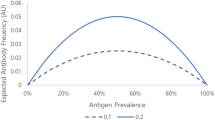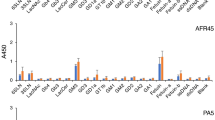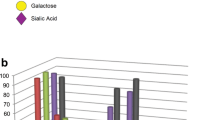Abstract
A SYSTEM of inherited serum groups has been described by Grubb and Laurell1. Sera from certain patients with rheumatoid arthritis agglutinated Rh-positive red cells which had been coated with selected incomplete anti-D. The agglutination was inhibited by sera from about 60 per cent of normal individuals, who were said to be Gm(a+) because the inhibiting substance was located in the gamma-globulin fraction of serum. This substance was inheritable, determined by the gene Gma, which expressed itself in single or double dose. The corresponding allele was called Gm.
This is a preview of subscription content, access via your institution
Access options
Subscribe to this journal
Receive 51 print issues and online access
$199.00 per year
only $3.90 per issue
Buy this article
- Purchase on Springer Link
- Instant access to full article PDF
Prices may be subject to local taxes which are calculated during checkout
Similar content being viewed by others
References
Grubb, R., and Laurell, A.-B., Acta Path. Microbiol. Scand., 39, 390 (1956).
Harboe, M., and Lundevall, J., Acta Path. Microbiol. Scand., 45, 357 (1959).
Stratton, F., and Renton, P. H., “Practical Blood Grouping” (Oxford, 1958).
Author information
Authors and Affiliations
Rights and permissions
About this article
Cite this article
HARBOE, M. A New Hæmagglutinating Substance in the Gm System, Anti-Gm. Nature 183, 1468–1469 (1959). https://doi.org/10.1038/1831468a0
Issue Date:
DOI: https://doi.org/10.1038/1831468a0
This article is cited by
-
Entwicklung der Gm-Eigenschaften beim Kind
Deutsche Zeitschrift f�r die Gesamte Gerichtliche Medizin (1963)
-
Das Serum-Gruppen-System Gma Gmb in der Vaterschaftsbegutachtung: Mutmaßlichkeitswerte nach der Essen-Möller-Formel
Blut Zeitschrift für die Gesamte Blutforschung (1962)
-
A Rare Phenotype within the Gm System
Nature (1961)
-
A Notation for the Gm Groups
Nature (1961)
-
Familienuntersuchungen zur Frage der Vererbung der Eigenschaft Gma (gleichzeitig mit Hp-Befunden)
Blut Zeitschrift für die Gesamte Blutforschung (1961)
Comments
By submitting a comment you agree to abide by our Terms and Community Guidelines. If you find something abusive or that does not comply with our terms or guidelines please flag it as inappropriate.



